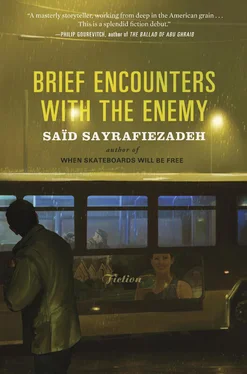“Eight hundred and eighty hiding,” our sergeant had told us. How he’d come up with that number, we didn’t know. It was so specific, we thought it must be true.
Ten hours a day we worked on that bridge. We’d wake up in the morning when it was dark, and we’d eat our powdered eggs in darkness, and by the time we walked up the path and reached the valley, the sun would just be rising, and the light would seem to be emanating upward from the valley, golden and warm, with traces of pinks and reds. One of the guys, who worked at a used-car dealership, said that if he was going to make a car commercial, he’d use the valley as a backdrop to portray things like power and eternity, and everyone said that was right, that they’d buy that car for sure.
But the truth was that no one really wanted to get the bridge built, because no one wanted to get over the hill. We didn’t say this out loud; instead, we worked as slowly as possible, and as incompetently. We accidentally dropped tools into the valley. I once dropped my blowtorch. It slipped from my hands like a bar of soap and bounced down the cliff until it took flight into the abyss.
“Do you know how much that blowtorch cost?” my sergeant screamed. He screamed like the money was coming out of his own pocket. He screamed like I had dropped his daughter in the valley. He stared at me for so long, one inch from my face, breathing like he’d run a race, his breath smelling like powdered eggs, that I thought he was actually asking if I knew how much it cost.
“A hundred and thirty-five dollars?” I guessed.
This caught him by surprise. “It cost forty dollars,” he said.
That didn’t seem like all that much.
“I should drop you in the valley,” he said. He made me do push-ups, right then and there, thirty push-ups. I got down on the ground, but I couldn’t do them. He told me to take my backpack off and try again, but I still couldn’t do them. This pissed him off even more. He put me to work cleaning the bathrooms, which was fine by me. I could have scrubbed toilets for the rest of my tour and been perfectly content. I could have scrubbed toilets for the rest of my life. Anything not to get over that hill and find eight hundred and eighty enemy waiting. But the next day I was back working on the bridge, bright and early. He needed all the help he could get. His superiors were probably screaming at him an inch from his face. Their superiors were screaming at them, and so on and so forth, until you got all the way up to the president screaming and panting as if he’d just run a race. Meanwhile, on the other side of the country, the casualties were mounting.
Day after day, we hammered and welded. Fifty guys pounding at the same time. The sounds echoed through the valley from morning to night, so that if the enemy didn’t know we were coming, they knew now.
One night, one of the guys said that we should go on strike. He was a farm boy from Iowa or Idaho, big and pink. Half the guys were farm boys. The other half were black boys. There was a smattering of others, like me and the future politician, but those were the basic demographics.
“Put down the tools of your trade, men,” the farm boy said. He’d heard that somewhere.
“I’m not putting a damn thing down,” one of the black boys said. “I’m trying to learn a skill.” Then he whispered to everyone, “I pay attention. I ask questions. I watch everything.” He made it sound as if he were planning to rob a bank. Which, I suppose, is how you feel when you’ve joined the army not because you have beliefs but because you want a job.
So we spent the better part of four months working on that bridge, but even when you work slowly and incompetently, you make progress. And when we arrived at the other side of the valley, we couldn’t help but have a twisted feeling of pride. Yet the moment we stepped off the bridge and faced the hill, we knew we had entered no-man’s-land. We had colluded in our own demise.
The hill wasn’t like the path. It was rocky and gray with no growth and no place to hide. It looked like a giant bowl of uncooked oatmeal. It looked like a place you could easily bury fifty bodies and no one would know.
“No time like the present,” the sergeant said. And we put our backpacks on and our visors down and we raised our guns and started up.
The truth was that none of us had joined for the right reasons. I might have thought I had in the very beginning, when I’d gone to the Career Center to sign the papers and take the physical and get the brochure that promised a “life-altering experience” and showed half a dozen young men in uniform standing on a beach and looking like they were having the time of their lives. It was easy to delude myself because everyone was congratulating me for living up to my ideals. Who would want to argue with that? There were three hundred people at my going-away party at work, chanting, “Luke! Luke! Luke! U.S.A.! U.S.A.!” There were people there who had never said a word to me, who had never so much as looked at me in the hallway, including the managing director. Now they were acting like they’d known my name all along, like I was a movie star making a guest appearance at their company. All the guys were shaking my hand, and all the girls were kissing my cheek. The managing director gave an impromptu speech about “men like Luke,” and about how my job would be there when I got back in a year, because that was company policy. It was the most boring job in the world, and I didn’t want it to still be there when I got back. I was sure that something miraculous was going to happen to change my situation and make me into someone new. All I did was sit in a cubicle eight hours a day, five days a week, staring at a computer as I filled in the little empty blocks on a spreadsheet. Click, drag, drop. Click, drag, drop . Half the time there wasn’t anything to do, and I would sit there staring at the blank screen, pretending that I was working and wishing I could go online and look at porn. Click, drag, drop . This is what happens when you have an associate’s degree.
But at my going-away party, I soaked up the applause. I thanked the managing director for all his support. I thanked everyone for coming. They stood around smiling and waiting for me to say something special, something profound. Three hundred people staring at me with my face covered in strawberry lipstick. Then someone in the back yelled, “Shoot some of those motherfuckers for me, Luke!” That broke the ice and made everyone laugh, and we sliced up the big red-white-and-blue cake they had all chipped in for.
It wasn’t until the moment when we started up that hill that I understood I’d come here for all the wrong reasons. Vanity and pride topped the list. Girls too — if I was being completely honest. In other words, ideals were very low. Staring at a hilltop that was getting closer and closer, I would have traded all of it never to have to see what was on the other side.
When we got to the top, the sergeant at our rear, we peered over like scared little boys, our heads low and our eyes half closed, and that was when we realized there was no one there. Not a soul. All that existed was a wide-open space, a prairie almost, bordered on one side by a lake and on the other by more prairie. It surprised everyone, this desolation, including the sergeant, who wanted to move up front and commanded us to follow him into the great unknown where there was no sign of life.
That first day we explored and came up empty. The next day twenty-five guys went back to discover nothing. After that, fifteen guys went, then ten, then it was decided the exploration was a waste of time and energy, that the reconnaissance had been wrong and the enemy was nowhere around, and all we needed was one guy to go along the path and over the bridge and up the hill once a day to make sure there was nothing out of the ordinary.
Читать дальше












